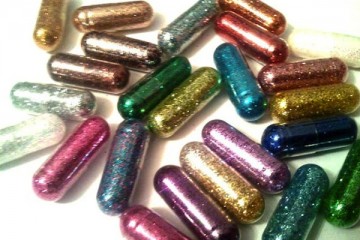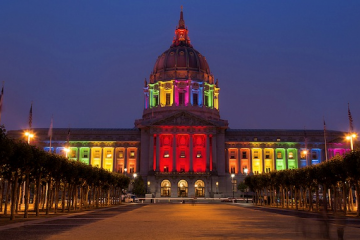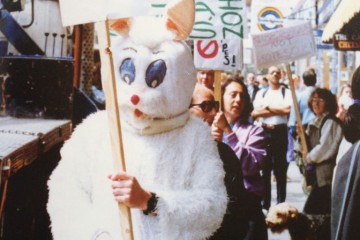The City That Was: Insider Jokes at the Aub Zam Zam
In The City That Was, Bohemian Archivist P Segal tells a weekly story of what you all missed: the days when artists, writers, musicians, and unemployed visionaries were playing hard in the city’s streets and paying the rent working part time.

Every so often, to avoid sinking into annoying nostalgia, it’s great to tell you stories about places that are still here for you to enjoy. Everything isn’t gone entirely… yet. The eccentrics of the former city may be disappearing, but they leave their legacies. Some of them leave funny ones, like Bruno at the Persian Aub Zam Zam.
If you love old bars, you’ve probably heard of the Aub Zam Zam on Haight Street, or possibly even been there. It’s virtually unchanged since it opened in 1941. For nearly half a century, Bruno Mooshei ran the bar his father built, from 1951 until 1999, and I can assure you that it was the most precision-run drinking establishment in town.
The Mooshei family came to America from Iran. They were Assyrians, and Mooshei père made his bar look like home. A Moorish archway divides the bar room from the back room with tables, an area of the bar Bruno didn’t particularly like. He preferred that people sit around the horseshoe-shaped bar, where he presided—always wearing a tie—in front of the Persian mural above the bottles.
Time made no dent whatsoever on Bruno’s bar. The music his father put on the jukebox was still on it. It had the same upholstery and the same paper napkins, with the same vintage logo in the 1990s that was modern in 1941.
Bruno had absolute, inflexible rules for what happened in his bar. They weren’t posted anywhere; you just had to know what they were. Either you had a savvy friend who took you there the first time, or you learned by experience and observation. Sometimes you learned by getting kicked out.
The shape of the bar gave everyone a view of the patrons on the other side. Even if we didn’t know our fellow drinkers, we all knew what to expect from Bruno. When the door opened and a stranger walked in, the regulars would snap to attention to watch the drama.
The stranger would settle in at the bar and order a vodka martini. The people around the bar stifled their giggles and exchanged knowing glances across the horseshoe. Bruno bristled at the words “vodka martini.” “No, you’re going to have to go to the bar at the corner,” he’d say.
“Oh, that’s okay,” the innocent stranger would reply. “I’ll have something else.”
“No, you’re going to have to go to the bar at the corner,” Bruno insisted, pointing towards the door. Anyone ordering such an abomination was simply not welcome.
Ordering a vodka martini, or any drink made with coffee, would get you ejected instantly. You ordered a martini. You got Boord’s gin and poussierè vermouth in a 1000-to-one ratio. If you really wanted vodka, you ordered something else. The women got their drinks on a napkin; the men did not. Martinis cost $2.50.
There were other ways to get 86’d, too. Seating a party of three at a table for four in the back room one night landed two friends and me on the street. Another time, someone approached the friend I was with for a light (in the politically incorrect old days, people smoked cigarettes in bars). Bruno saw the interaction and said, “I won’t have any drug dealing in my bar. You two have to leave.”
My friend protested, but Bruno wasn’t having it. He and the person with an unlit cigarette were shown the door, and I reluctantly left with them. It was the evening’s entertainment for the regulars. I’m sure they were all smiling discretely when we left, the same kind of insider giggle we always had ourselves when some hapless tourist ordered the despicable vodka martini. Shadenfreude.
In 1999, when Bruno got ill, two of his devoted regulars bought the place. Robert Clarke and Dianne Epping put on a coat of fresh paint and took 50 years worth of tobacco off the murals, but otherwise changed very little. They did drop the “Persian” in the name, and one significant thing is different: now when you order a martini, there’s no wrong choice. I was shocked, but as the bartender pointed out, Bruno’s father owned the building. He didn’t have to make money.









